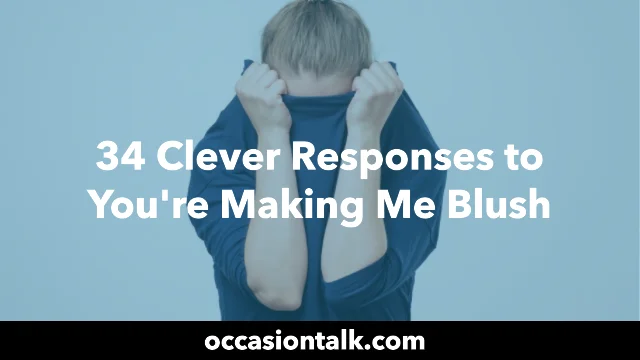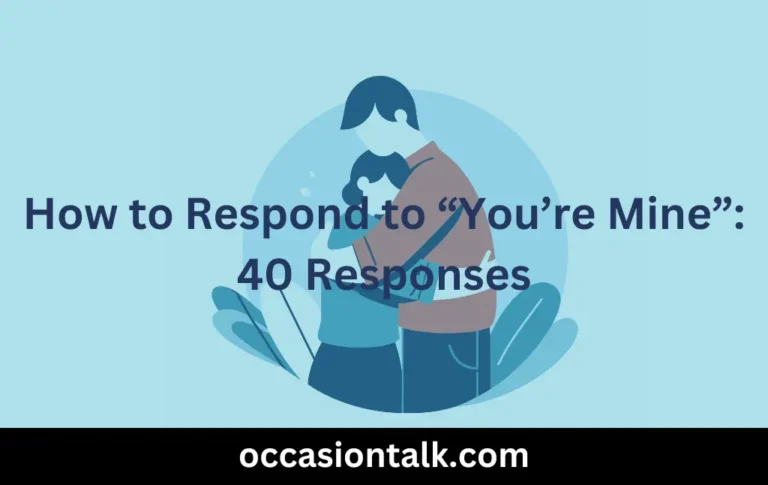35 Best Responses to “Why Do You Care?”
When someone asks you “Why do you care?”, it can be a challenging question to answer.
It can be a genuine inquiry, a defensive response, or even a test. But whatever the reason behind the question, it’s important to have a well-thought-out response.
This list of 35 responses will help you navigate these waters, while maintaining your composure and the integrity of the conversation.
How to Respond to “Why Do You Care?”
Being asked “why do you care?” can be a challenging experience. It can be a genuine question, a defensive response, or even a test.
But whatever the reason behind the question, it’s important to have a well-thought-out response.
Here are the 35 best responses to “Why do you care?”:
- “Because I believe in you and your potential.”
- “Just checking in, is that okay?”
- “Because your well-being matters to me.”
- “I’m programmed to care, can’t help it.”
- “Why not?”
- “Because that’s what friends do.”
- “It’s in my nature to care.”
- “I thought it would be nice to ask.”
- “Can’t a person be concerned?”
- “Because I do, is that a problem?”
- “Call it human instinct.”
- “I wouldn’t ask if I didn’t.”
- “Because you’re worth caring about.”
- “I guess I’m just a caring person.”
- “Am I not allowed to?”
- “I tend to care about all my friends.”
- “Doesn’t everyone deserve a little care?”
- “Why wouldn’t I?”
- “You’d do the same for me, wouldn’t you?”
- “The world could use a little more care, don’t you think?”
- “I just want to make sure you’re okay.”
- “I’ve got a big heart, what can I say?”
- “Because your happiness is important to me.”
- “That’s just what good friends do.”
- “Silence doesn’t always mean everything is fine.”
- “Honestly, I can’t pinpoint why. I just know I do.”
- “We’re in this together, aren’t we?”
- “Caring is a reflex. Some have it stronger than others.”
- “Wouldn’t you rather have someone who cares too much than not at all?”
- “I care because I believe everyone deserves compassion.”
- “I was taught to be kind and show concern for others.”
- “Call me old-fashioned, but caring is just the right thing to do.”
- “I care because putting good into the world matters to me.”
- “Caring may seem unusual these days, but the world needs more of it.”
- “Because it’s too easy not to care.”
1. “Because I believe in you and your potential.”
People often ask “Why do you care?” when they’re doubting themselves. This response sends a clear message that you have faith in their abilities.
2. “Just checking in, is that okay?”
This answer gently reminds them that expressing care and concern is a normal part of human relationships.
3. “Because your well-being matters to me.”
If the conversation is serious, this straightforward response reinforces your genuine concern for their welfare.
4. “I’m programmed to care, can’t help it.”
Inject a hint of humor! This light-hearted response can help diffuse tension and keep the conversation moving.
5. “Why not?”
Sometimes the simplest answer is the best one. This response returns the question to them, prompting them to consider why you shouldn’t care.
6. “Because that’s what friends do.”
When the question arises from a friend, this firm response says you’re there for them and will always support and care for them.
7. “It’s in my nature to care.”
This response acknowledges your caring personality without making it about them, which can be useful if they’re in a defensive mood.
8. “I thought it would be nice to ask.”
Keep it light and noncommittal by focusing on the intention behind your actions.
9. “Can’t a person be concerned?”
Playfully pointing out the oddity in questioning your concern could lighten the mood.
10. “Because I do, is that a problem?”
A firm yet open response, this can put the ball back in their court, opening up the conversation.
11. “Call it human instinct.”
A light-hearted response that gently deflects while keeping the atmosphere casual.
12. “I wouldn’t ask if I didn’t.”
This response lays bare your sincerity, making it clear that you’re asking out of genuine interest and concern.
13. “Because you’re worth caring about.”
This response is a heartfelt affirmation of their value to you.
14. “I guess I’m just a caring person.”
This response frames your inquiry as a part of your inherent nature, rather than something peculiar or targeted.
15. “Am I not allowed to?”
A slightly confrontational response, this question can help clarify any misconceptions about your intentions.
16. “I tend to care about all my friends.”
This reminds them that your concern isn’t out of the ordinary, but a consistent part of your friendships.
17. “Doesn’t everyone deserve a little care?”
This universal statement can help them realise that showing interest is a natural part of human interaction.
18. “Why wouldn’t I?”
Here, you challenge the premise of their question, asserting the normality of showing care.
19. “You’d do the same for me, wouldn’t you?”
This response reminds them of reciprocity, the common thread that binds human relationships.
20. “The world could use a little more care, don’t you think?”
A broad-based, philosophical response can underscore the importance of showing empathy and interest in today’s world.
21. “I just want to make sure you’re okay.”
This direct, heartfelt response can help them see that your intentions are purely out of concern.
22. “I’ve got a big heart, what can I say?”
A comical, self-deprecating response can lighten the mood and defuse defensiveness.
23. “Because your happiness is important to me.”
A sincere expression of care and concern for their well-being.
24. “That’s just what good friends do.”
This statement reinforces the unwritten rule of friendship – mutual concern and care.
25. “Silence doesn’t always mean everything is fine.”
Indicate your understanding that people often hide their true feelings, and it’s okay to express concern.
26. “Honestly, I can’t pinpoint why. I just know I do.”
Sometimes, we don’t understand why we care. This answer is genuine and can be comforting.
27. “We’re in this together, aren’t we?”
A reminder of your shared experiences and mutual support can help them feel understood.
28. “Caring is a reflex. Some have it stronger than others.”
This philosophical response can pave the way for a deeper, more meaningful conversation about empathy and human nature.
29. “Wouldn’t you rather have someone who cares too much than not at all?”
This response challenges them to look at the situation from a different perspective.
30. “I care because I believe everyone deserves compassion.”
This focuses on the universal need for compassion. It reminds them that caring should not be limited.
31. “I was taught to be kind and show concern for others.”
This answer highlights your upbringing and values around empathy. It shows your care comes from a well-meaning place.
32. “Call me old-fashioned, but caring is just the right thing to do.”
A lighthearted response that frames caring as a traditional virtue we should uphold. It presents your care as a moral obligation.
33. “I care because putting good into the world matters to me.”
This response emphasizes doing good and adding positivity to the world. It presents your care as part of making a difference.
34. “Caring may seem unusual these days, but the world needs more of it.”
This reminds us that caring stands out today, when indifference is common. It reaffirms caring is what the world needs.
35. “Because it’s too easy not to care.”
This final response encompasses a broader commentary on societal indifference, reminding them that care should be the norm, not the exception.
You can also check: 48 Best Replies to Can We Talk Text
Why do people say why do you care?
People often ask “Why do you care?” for various reasons – to question your motives, gauge your interest, or sometimes even as a defensive mechanism if they’re feeling vulnerable.
Here are the main reasons why someone might pose this question:
- Inquiry of Interest: They are curious about why you are interested in their affairs. This could be due to surprise, curiosity, or sometimes a desire for reassurance about your intentions.
- Testing Motives: By asking “Why do you care?”, the person may be trying to understand your intentions better, especially if they perceive your involvement in their situation as unexpected or unwarranted.
- Defensive Mechanism: If someone is feeling vulnerable or uncomfortable about a situation, they may ask “Why do you care?” as a way to divert the conversation or create distance.
- Lack of Self-worth: In some cases, individuals with self-esteem issues might question why anyone would care about them or their situation, hence asking the question.
- Provocation: On a more hostile note, the phrase could also be used to provoke or question your authority on becoming involved in certain issues.
- Cultural Differences: In certain cultures or social contexts, open expression of concern or affection may not be as common, leading to a curious or even skeptical response when care is shown.
The tone, context, and relationship between the two people involved will significantly impact how this question is understood and addressed.
The person could genuinely be seeking an answer, or they could be making a rhetorical statement out of frustration or disbelief.
RELATED:
- 25 Best Responses to “Why Do You Like Me?” for Her
- 35 Good Comebacks Someone Who Thinks They Are Better
- 54 Best Ways to Respond to “Huh” For Every Situation
- 34 Clever Responses to You’re Making Me Blush
Final Thoughts
The question “Why do you care?” is an invitation for you to express your concerns and intentions.
Creating the perfect answer can be a blend of empathy, wit, and honesty.
Next time you’re faced with this question, remember these tips and responses.
Breathe, trust your intuition, and let your compassionate side show!






